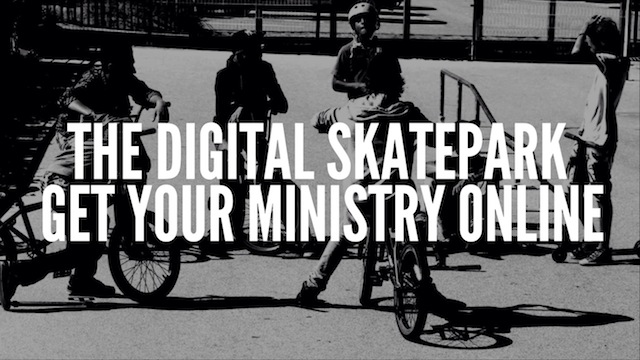This is a 10-part blog series on HOW TO GET YOUR MINISTRY ONLINE. It is written with a primary application for youth ministries but a more general church or other ministries application should be obvious enough. You can follow the DIGITAL SKATEPARK tag or come back to this post for links out to the rest of the series.
- THE DIGITAL SKATEPARK
- ONLINE COMMUNITY CONTRIBUTES TO OFFLINE COMMUNITY
- DON’T REINVENT THE INTERNET
- SOCIAL MEDIA SOAP OPERA
- CREATE AN OFFICIAL “HEADQUARTERS”
- MINIMAL IS BETTER THAN MAYHEM
- NOBODY LIKES STALE BREAD
- CREATE MEDIA STREAMS
- ALL STREAMS FLOW INTO THE SEA
- MAKE SOME NOISE!
DIGITAL SKATEPARK
In 1990s youth ministry, one way to connect with teenagers was at the local skatepark. This is where lots of them hung out, so this was a good place to connect socially with teenagers who were already part of your youth ministry and their friends.
Teenagers still hang out at skateparks – as they do at the beach, train station, shopping centres, etc. – however the one place where the majority of the teenagers in your area will hang out every day is online. In that sense, the online world is like a digital skatepark or location where young people get together.
Computers are being used less to stay connected online as smart phones become more common among young people. Checking in on a social network is often the last thing viewed before your head hits the pillow and the first thing you reach for when your alarm goes off in the morning. This means that teenagers no longer need to sit down at a computer to be connected, but literally have 24/7 connectivity.
While the Internet and mobile devices can be used for great harm, they can also be unleashed for great good. There is a great opportunity for connecting with young people outside of normal youth ministry programs. These connections ought not replace offline, face-to-face interaction, but the online/mobile realm can be used to complement offline fellowship.
I started experimenting with online communication within youth ministry from the early 2000s. I believe that it can add significant value to your youth ministry and actually requires a lot less time than lots of people think.
—
This series forms the basis of a chapter in a forthcoming Youth Ministry book to be published by Anglican Youthworks. The rest of the book is written by Scott Petty (Youth Minister from Christ Church St Ives) and is published here with his permission.


8 Replies to “THE DIGITAL SKATEPARK // GET YOUR MINISTRY ONLINE”
Comments are closed.